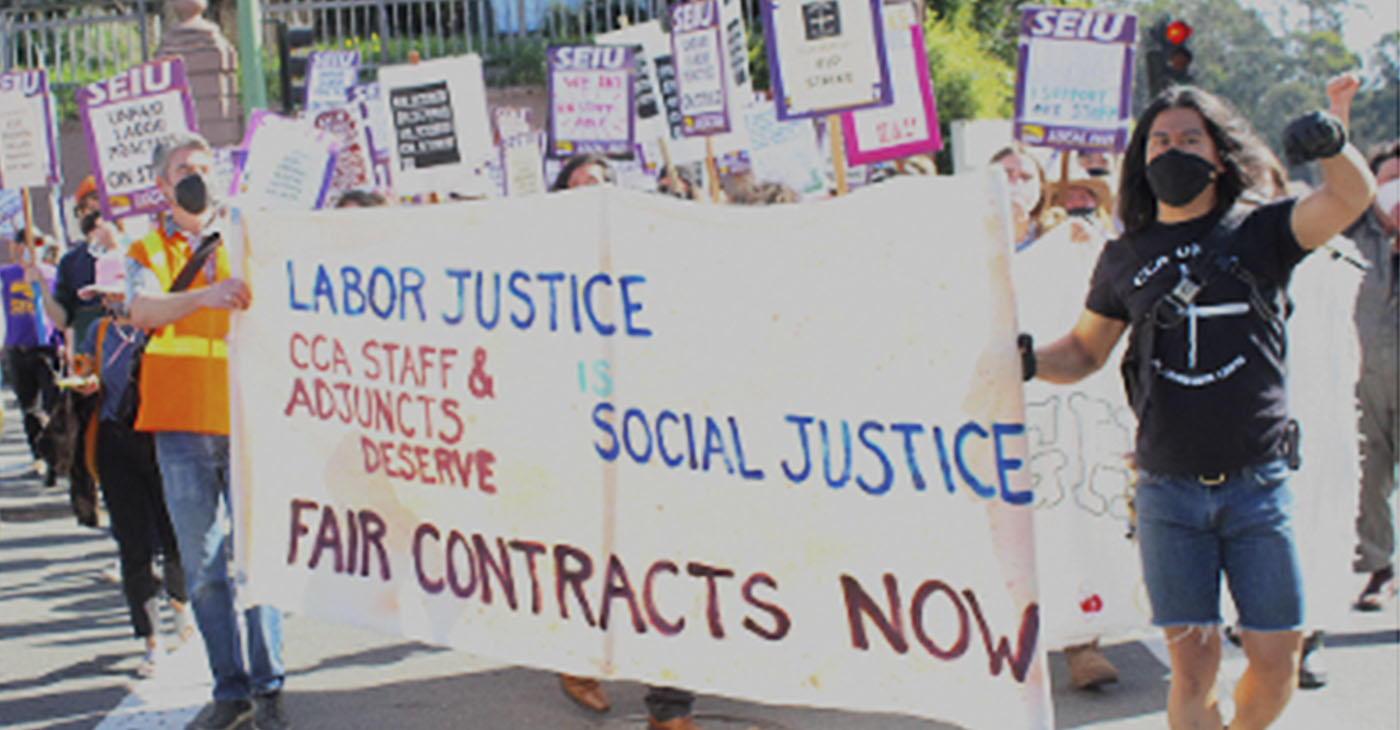Activism
California College of the Arts Staff Union Strikes, Citing Unfair Labor Practices
Members of the California College of the Arts staff union point to salaries at the administrative level, which they see as excessively high, and question why the school isn’t paying their lower wage workers more. The school’s 2020 990 filing shows four administrators made well over $270,000 in 2019. President Stephen Beal made a base salary of more than $580,000 while working 37.5 hours per week. Such a salary is over $150,000 more than both the current Mayor of San Francisco and the President of the United States. The 990 also estimates Beal made over $100,000 in addition to his base salary in “other compensation from the organization and related organizations.”

By Zack Haber
The staff union at California College of the Arts (CCA), a small, private college founded in 1907, engaged in a four-day strike and protest. They’re accusing the school of unfair labor practices that include stalling contract negotiations in an effort to withhold pay increases and benefits.
“We have a unionized workplace now,” said SEIU 1021 chapter President Matt Kennedy, who’s worked in the tech department of the college for 10 years. “CCA needs to acknowledge that. It’s taking forever to come to an agreement because they aren’t.”
The protests featured rallies, teach-ins, group art-making projects and daily pickets that started February 8 and end on February 12. The actions are taking place on the school’s San Francisco campus every day except Wednesday, when the protest moved to the school’s Oakland campus. Around 200 people, including union members and their supporters, showed up each day to the pickets.
In interviews with this reporter, Kennedy, along with three other current or former workers at CCA, all accused the school of bargaining in bad faith.
“CCA has been stonewalling and dragging their feet,” said Kēhau Lyons, an academic advisor who’s worked at CCA for about two and a half years and has been observing the bargaining sessions. “The management side just doesn’t want to get this completed.”
CCA’s staff successfully voted to unionize with SEIU 1021 in April of 2019. Since then, staff members say they have not received any raises outside of those required by law. While contract negotiations started in October of 2019, CCA’s staff is still working without a union contract. A study by Bloomberg Law based on National Labor Relations Board data shows that, between 2004 and the first half of 2021, the average amount of time it took employers and unions to agree on a first contract was a little over one year and one month. The union and CCA’s negotiations have, thus far, taken over two years and four months.
In an email, CCA Director of Communications Daniel Owens-Hill, disagreed with staff who accused the college of stalling negotiations.
“CCA remains ready and willing to negotiate as frequently as needed to achieve a fair and mutually beneficial collective bargaining agreement,” Owens-Hill wrote. “The college has a comprehensive proposal on the table that provides wage increases for our valued staff while also maintaining our ongoing commitment to student financial aid and a financially sustainable future.”
On September 27 of last year, National Labor Relations Board Regional Director Valerie Hardy-Mahoney sided with the union by issuing a Complaint and Notice of Hearing stating that CCA had “been failing and refusing to bargain collectively and in good faith with the union.” In that same document, she also proposed new bargaining guidelines for the college to follow going forward.
CCA is currently offering a 2% wage increase to all staff in the union. Workers interviewed for this article see that raise as inadequate and stressed that their most important request while bargaining has been “raising the floor” for staff salaries. To pay the expenses needed to live in the Bay Area, staff said, they want a minimum wage of $55,000. Kennedy said salary records show 40% of CCA staff makes less than $55,000 per year, and 10% make between $36,000 and $45,000. For many workers, the 2% increase would fall short of providing the minimum salary.
CCA workers point to salaries at the administrative level, which they see as excessively high, and question why the school isn’t paying their lower wage workers more. The school’s 2020 990 filing shows four administrators made well over $270,000 in 2019. President Stephen Beal made a base salary of more than $580,000 while working 37.5 hours per week. Such a salary is over $150,000 more than both the current Mayor of San Francisco and the President of the United States. The 990 also estimates Beal made over $100,000 in addition to his base salary in “other compensation from the organization and related organizations.”
In April of 2020, Beal’s base salary was cut by 25%, while the senior vice president’s was cut by 10%, and the vice president’s was cut by 5%.
CCA staff union members say they have noticed a high employment turnover rate which they attribute to their co-workers not receiving high enough pay. Emails from CCA’s Human Resources Department show that, since August, 19 staff union members have stopped working at the school, which is about 15% of the total union staff.
Randy Nakamura has taught as an adjunct at CCA’s graduate design program for the last six years, and is also part of CCA’s adjunct union’s bargaining unit. CCA’s adjunct union is separate from the staff union, but Nakamura and other adjuncts are also trying to reach a contract with CCA.
Nakamura says that since the CCA adjunct union contract expired in June of 2020, he and his fellow union members’ experiences bargaining to renew their contract have been similar to the staff union’s efforts to get CCA to agree to a first contract.
“CCA has taken every opportunity to not bargain with us,” said Nakamura. “Sometimes they’ll make us wait an hour and a half in a three-hour bargaining session just to talk.”
After a year and a half of bargaining, the adjunct union has not yet been able to renew its contract with CCA. Seeing themselves in a similar struggle as the staff union, over 100 CCA’s adjunct union member supported CCA’s staff union by sympathy striking, and not teaching classes during the strike.
Some adjuncts also joined staff on the picket line. Additionally, members of the CCA Student Union and some other CCA students who sympathize with the staff strike criticized CCA’s 2% wage increase offer as too low and picketed and did not attending classes to show their support.
“The staff and adjunct’s working conditions are student learning conditions,” the CCA Student Union wrote on a recent instagram post. “We as students completely benefit from union bargaining and a fair contract for our beloved staff.”
CCA faculty who are tenured or on tenure track are not part of the staff union and have separate independent contracts. But they also showed support.
“We are not willing to cross the picket line,” reads a support letter released on February 7 that 99 such faculty members signed. “[We] will instead find ways to express peaceful solidarity during the strike, including engaging in strike-related teach-ins and pedagogical activities.”
Through their spokesperson, David Owens-Hill, CCA criticized the strike.
“At a time when we are making rapid progress in negotiations and have reached agreement on so many items, a strike benefits no one,” wrote Owens-Hill in an email, “not our staff, not our faculty, and certainly not our students, who have just returned to fully in-person classes for the first time in nearly two years.”
CCA staff union members disagree with Owens-Hill.
“It’s important to show in our strike that CCA can’t get away with this,” said SEIU’s Kennedy. “Better working conditions and compensation make better learning conditions, and the college needs to make that a priority. But they’re not.”
Activism
Gov. Newsom Approves $170 Million to Fast Track Wildfire Resilience
AB 100 approves major investments in regional conservancies across the state, including over $30 million each for the Sierra Nevada, Santa Monica Mountains, State Coastal, and San Gabriel/Lower LA Rivers and Mountains conservancies. An additional $10 million will support wildfire response and resilience efforts.

By Bo Tefu
California Black Media
With wildfire season approaching, last week Gov. Gavin Newsom signed Assembly Bill (AB) 100, unlocking $170 million to fast-track wildfire prevention and forest management projects — many of which directly protect communities of color, who are often hardest hit by climate-driven disasters.
“With this latest round of funding, we’re continuing to increase the speed and size of forest and vegetation management essential to protecting communities,” said Newsom when he announced the funding on April 14.
“We are leaving no stone unturned — including cutting red tape — in our mission to ensure our neighborhoods are protected from destructive wildfires,” he said.
AB 100 approves major investments in regional conservancies across the state, including over $30 million each for the Sierra Nevada, Santa Monica Mountains, State Coastal, and San Gabriel/Lower LA Rivers and Mountains conservancies. An additional $10 million will support wildfire response and resilience efforts.
Newsom also signed an executive order suspending certain regulations to allow urgent work to move forward faster.
This funding builds on California’s broader Wildfire and Forest Resilience Action Plan, a $2.7 billion effort to reduce fuel loads, increase prescribed burning, and harden communities. The state has also launched new dashboards to keep the public informed and hold agencies accountable.
California has also committed to continue investing $200 million annually through 2028 to expand this effort, ensuring long-term resilience, particularly in vulnerable communities.
Activism
California Rideshare Drivers and Supporters Step Up Push to Unionize
Today in California, over 600,000 rideshare drivers want the ability to form or join unions for the sole purpose of collective bargaining or other mutual aid and protection. It’s a right, and recently at the State Capitol, a large number of people, including some rideshare drivers and others working in the gig economy, reaffirmed that they want to exercise it.

By Antonio Ray Harvey
California Black Media
On July 5, 1935, President Franklin D. Roosevelt signed into federal law the National Labor Relations Act (NLRA). Also known as the “Wagner Act,” the law paved the way for employees to have “the right to self-organization, to form, join, or assist labor organizations,” and “to bargain collectively through representatives of their own choosing, according to the legislation’s language.
Today in California, over 600,000 rideshare drivers want the ability to form or join unions for the sole purpose of collective bargaining or other mutual aid and protection. It’s a right, and recently at the State Capitol, a large number of people, including some rideshare drivers and others working in the gig economy, reaffirmed that they want to exercise it.
On April 8, the rideshare drivers held a rally with lawmakers to garner support for Assembly Bill (AB) 1340, the “Transportation Network Company Drivers (TNC) Labor Relations Act.”
Authored by Assemblymembers Buffy Wicks (D-Oakland) and Marc Berman (D-Menlo Park), AB 1340 would allow drivers to create a union and negotiate contracts with industry leaders like Uber and Lyft.
“All work has dignity, and every worker deserves a voice — especially in these uncertain times,” Wicks said at the rally. “AB 1340 empowers drivers with the choice to join a union and negotiate for better wages, benefits, and protections. When workers stand together, they are one of the most powerful forces for justice in California.”
Wicks and Berman were joined by three members of the California Legislative Black Caucus (CLBC): Assemblymembers Tina McKinnor (D-Inglewood), Sade Elhawary (D-Los Angeles), and Isaac Bryan (D-Ladera Heights).
Yvonne Wheeler, president of the Los Angeles County Federation of Labor; April Verrett, President of Service Employees International Union (SEIU); Tia Orr, Executive Director of SEIU; and a host of others participated in the demonstration on the grounds of the state capitol.
“This is not a gig. This is your life. This is your job,” Bryan said at the rally. “When we organize and fight for our collective needs, it pulls from the people who have so much that they don’t know what to do with it and puts it in the hands of people who are struggling every single day.”
Existing law, the “Protect App-Based Drivers and Services Act,” created by Proposition (Prop) 22, a ballot initiative, categorizes app-based drivers for companies such as Uber and Lyft as independent contractors.
Prop 22 was approved by voters in the November 2020 statewide general election. Since then, Prop 22 has been in court facing challenges from groups trying to overturn it.
However, last July, Prop 22 was upheld by the California Supreme Court last July.
In a 2024, statement after the ruling, Lyft stated that 80% of the rideshare drivers they surveyed acknowledged that Prop 22 “was good for them” and “median hourly earnings of drivers on the Lyft platform in California were 22% higher in 2023 than in 2019.”
Wicks and Berman crafted AB 1340 to circumvent Prop 22.
“With AB 1340, we are putting power in the hands of hundreds of thousands of workers to raise the bar in their industry and create a model for an equitable and innovative partnership in the tech sector,” Berman said.
Activism
California Holds the Line on DEI as Trump Administration Threatens School Funding
The conflict began on Feb. 14, when Craig Trainor, acting assistant secretary for civil rights at the U.S. Department of Education (DOE), issued a “Dear Colleague” letter warning that DEI-related programs in public schools could violate federal civil rights law. The letter, which cited Title VI of the Civil Rights Act and the 2023 Supreme Court ruling in Students for Fair Admissions v. Harvard, which ended race-conscious admissions, ordered schools to eliminate race-based considerations in areas such as admissions, scholarships, hiring, discipline, and student programming.

By Joe W. Bowers Jr
California Black Media
California education leaders are pushing back against the Trump administration’s directive to dismantle diversity, equity, and inclusion (DEI) programs in its K-12 public schools — despite threats to take away billions in federal funding.
The conflict began on Feb. 14, when Craig Trainor, acting assistant secretary for civil rights at the U.S. Department of Education (DOE), issued a “Dear Colleague” letter warning that DEI-related programs in public schools could violate federal civil rights law. The letter, which cited Title VI of the Civil Rights Act and the 2023 Supreme Court ruling in Students for Fair Admissions v. Harvard, which ended race-conscious admissions, ordered schools to eliminate race-based considerations in areas such as admissions, scholarships, hiring, discipline, and student programming.
According to Trainor, “DEI programs discriminate against one group of Americans to favor another.”
On April 3, the DOE escalated the pressure, sending a follow-up letter to states demanding that every local educational agency (LEA) certify — within 10 business days — that they were not using federal funds to support “illegal DEI.” The certification requirement, tied to continued federal aid, raised the stakes for California, which receives more than $16 billion annually in federal education funding.
So far, California has refused to comply with the DOE order.
“There is nothing in state or federal law that outlaws the broad concepts of ‘diversity,’ ‘equity,’ or ‘inclusion,’” wrote David Schapira, California’s Chief Deputy Superintendent of Public Instruction, in an April 4 letter to superintendents and charter school administrators. Schapira noted that all of California’s more than 1,000 traditional public school districts submit Title VI compliance assurances annually and are subject to regular oversight by the state and the federal government.
In a formal response to the DOE on April 11, the California Department of Education, the State Board of Education, and State Superintendent of Public Instruction Tony Thurmond collectively rejected the certification demand, calling it vague, legally unsupported, and procedurally improper.
“California and its nearly 2,000 LEAs (including traditional public schools and charter schools) have already provided the requisite guarantee that its programs and services are, and will be, in compliance with Title VI and its implementing regulation,” the letter says.
Thurmond added in a statement, “Today, California affirmed existing and continued compliance with federal laws while we stay the course to move the needle for all students. As our responses to the United States Department of Education state and as the plain text of state and federal laws affirm, there is nothing unlawful about broad core values such as diversity, equity and inclusion. I am proud of our students, educators and school communities who continue to focus on teaching and learning, despite federal actions intended to distract and disrupt.”
California officials say that the federal government cannot change existing civil rights enforcement standards without going through formal rule-making procedures, which require public notice and comment.
Other states are taking a similar approach. In a letter to the DOE, Daniel Morton-Bentley, deputy commissioner and counsel for the New York State Education Department, wrote, “We understand that the current administration seeks to censor anything it deems ‘diversity, equity & inclusion.’ But there are no federal or State laws prohibiting the principles of DEI.”
-

 Activism4 weeks ago
Activism4 weeks agoOakland Post Endorses Barbara Lee
-

 Activism3 weeks ago
Activism3 weeks agoOakland Post: Week of April 2 – 8, 2025
-

 #NNPA BlackPress3 weeks ago
#NNPA BlackPress3 weeks agoTrump Profits, Black America Pays the Price
-

 Activism2 weeks ago
Activism2 weeks agoOakland Post: Week of April 9 – 15, 2025
-

 #NNPA BlackPress3 weeks ago
#NNPA BlackPress3 weeks agoHarriet Tubman Scrubbed; DEI Dismantled
-

 #NNPA BlackPress3 weeks ago
#NNPA BlackPress3 weeks agoTrump Targets a Slavery Removal from the National Museum of African-American History and Culture
-

 #NNPA BlackPress3 weeks ago
#NNPA BlackPress3 weeks agoLawmakers Greenlight Reparations Study for Descendants of Enslaved Marylanders
-

 #NNPA BlackPress3 weeks ago
#NNPA BlackPress3 weeks agoNew York Stands Firm Against Trump Administration’s Order to Abandon Diversity in Schools


























































